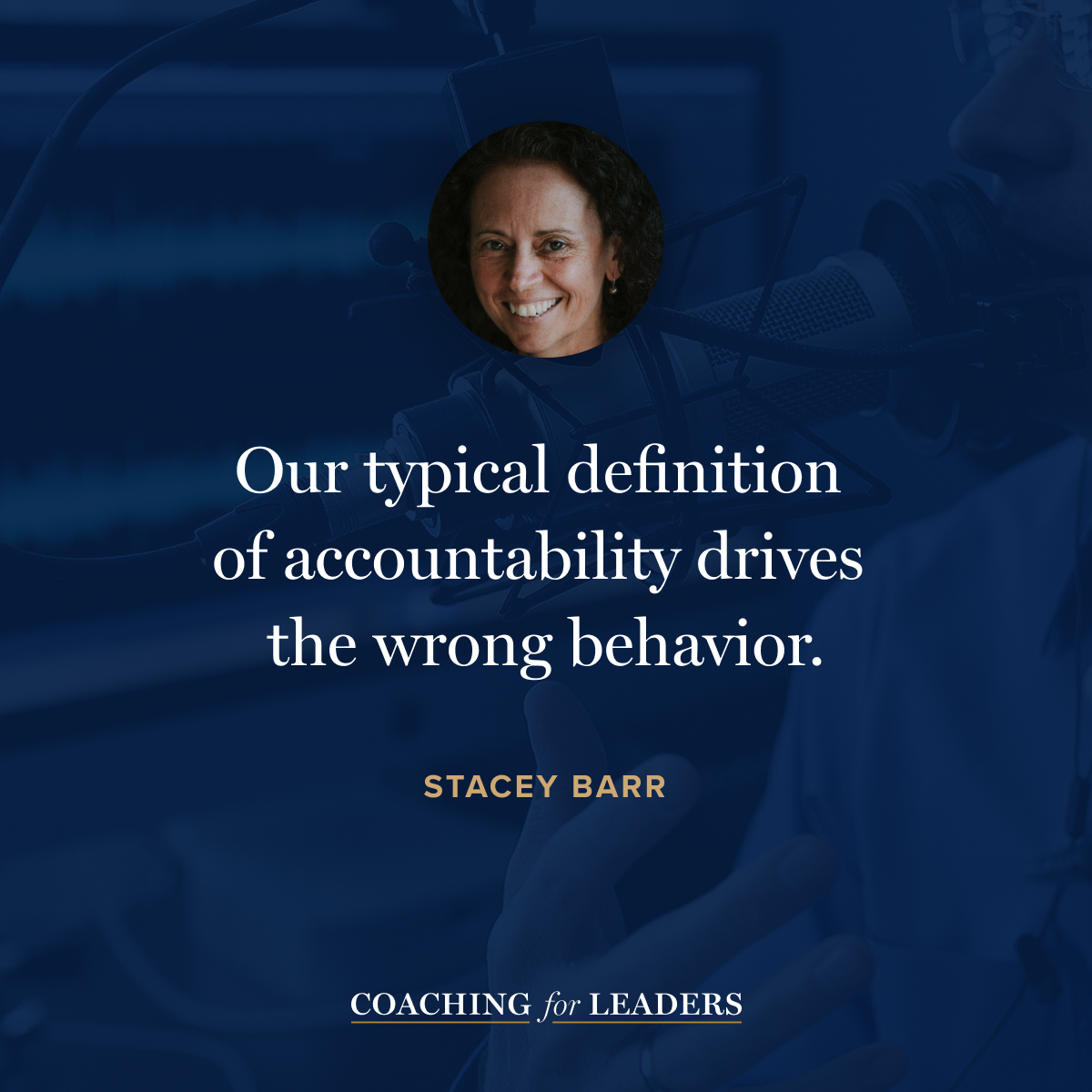3 Questions to Address Fear of KPI Accountability in the Moment
by Stacey Barr |If people fear accountability for KPIs, and we don’t uproot that fear, they won’t engage in more meaningful performance measure selection or improvement.

Accountability in general is hard enough to get people to take on. And accountability for KPIs or performance measures is one of the hardest to get people to take on. It can’t be forced, or it will backfire. We see it and talk about it all the time: people will game the data, game the measures or game the system to hit targets.
But we do need accountability if KPIs and measures are going to serve their purpose of performance improvement. We need the kind of
accountability that Peter Bregman describes in this HBR article:
“Accountability is not simply taking the blame when something goes wrong. It’s not a confession. Accountability is about delivering on a commitment. It’s responsibility to an outcome, not just a set of tasks. It’s taking initiative with thoughtful, strategic follow-through.”
Nonetheless, fear of accountability is real and common. And because no-one enjoys being called out on being afraid of something, it’s a challenge to address. Asking ‘why do you fear accountability?’ will get us precisely nowhere. It needs a subtle and compassionate approach if we’re going to have any chance whatsoever to reduce that fear and the barrier it holds up against meaningful performance measurement.
Next time you’re faced with resistance to KPIs that you suspect is rooted in a fear of accountability, try the following three questions to create the kind of dialogue that can loosen, and ultimately pull up, those roots.
Question 1: What feels unfair about being accountable for this measure?
The purpose for this first question is to make the fear of accountability visible, but also to make it okay. It’s normal. People write and talk about fear of accountability everywhere. But when you’re face-to-face with a person, don’t focus on the fear. Instead, talk about the challenges or pains of accountability that might be top-of-mind for them, such as:
- The KPI was poorly designed and isn’t relevant to my priorities.
- The target is way too ‘stretch’ for the resources I have.
- I’m not in control of hitting this target, or improving this KPI.
The energy of this first question is one of empathy.
Question 2: What could accountability for this measure be about, to be fair and useful?
The outcome of this second question is to break any mindset that there is no choice. Often KPI accountability feels unfair because of the traditional approach of blaming individual people for not hitting their KPI targets. We need to challenge this traditional approach and explore questions like these:
- Is it a person’s effort that determines if a target can be met, or is it the design of systems and processes and policies?
- Would we prefer that someone improve performance properly but fall short of a target, or game the system and hit the target?
- Is there a more constructive way to define what accountability for KPIs is really about?
The energy of this second question is one of possibility.
Question 3: What would need to change to make it fair and useful to be accountable for this measure?
This third question should fill in the missing information that makes accountability so uncertain and risky. Peter Bregman offers a framework to test what might be making accountability so elusive. And if we apply this framework specifically to KPI accountability, it raises the following questions:
- Clear expectations: What behaviours are expected when someone is accountable for a specific KPI?
- Clear capability: What skills or knowledge are needed to be accountable for a specific KPI? If the person doesn’t have these skills and knowledge yet, how will they get them?
- Clear measurement: What objective information will assess if someone is being appropriately accountable for a specific KPI?
- Clear feedback: How and with whom should the experience and results of being accountable for a specific KPI be discussed in order to achieve performance improvement for the KPI?
- Clear consequences: If someone fails or succeeds or partially succeeds to
fulfill their accountability for a specific KPI, what will happen to them? If reward and punishment don’t work (read Dan Pink’s work), then what motivates exceptional accountability?
The energy of this third question is one of practicality.
For more information, Dave Stachowiak interviewed me about accountability, on the Coaching for Leaders podcast episode 475.
To help uproot the fear of accountability for KPIs, we need to empathise with its unfairness, see possibilities for redefining it, and clarify its practicalities.
[tweet this]
Connect with Stacey
Haven’t found what you’re looking for? Want more information? Fill out the form below and I’ll get in touch with you as soon as possible.
167 Eagle Street,
Brisbane Qld 4000,
Australia
ACN: 129953635
Director: Stacey Barr





